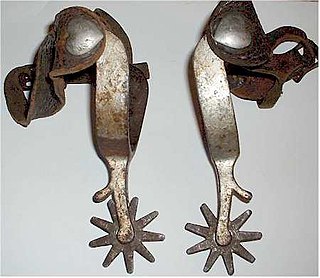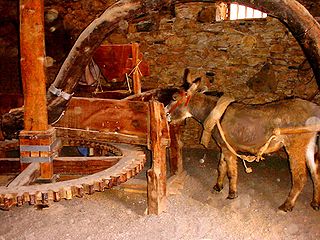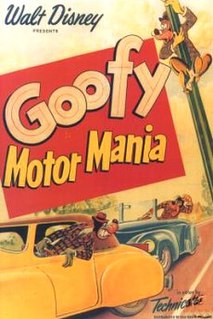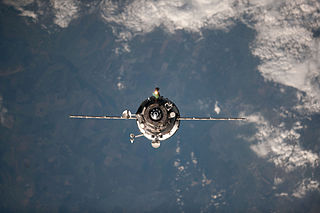
Horse teeth refers to the dentition of equine species, including horses and donkeys. Equines are both heterodontous and diphyodontous, which means that they have teeth in more than one shape, and have two successive sets of teeth, the deciduous and permanent sets.

A stagecoach is a four-wheeled public transport coach used to carry paying passengers and light packages on journeys long enough to need a change of horses. It is strongly sprung and generally drawn by four horses.

Vimāna are mythological flying palaces or chariots described in Hindu texts and Sanskrit epics. The "Pushpaka Vimana" of Ravana is the most quoted example of a vimana. Vimanas are also mentioned in Jain texts.

A spur is a metal tool designed to be worn in pairs on the heels of riding boots for the purpose of directing a horse or other animal to move forward or laterally while riding. It is usually used to refine the riding aids (commands) and to back up the natural aids. The spur is used in many equestrian disciplines. Most equestrian organizations have rules in about spur design and use and penalties for using spurs in any manner that constitutes animal abuse.

The south-pointing chariot was an ancient Chinese two-wheeled vehicle that carried a movable pointer to indicate the south, no matter how the chariot turned. Usually, the pointer took the form of a doll or figure with an outstretched arm. The chariot was supposedly used as a compass for navigation and may also have had other purposes.

A cultivator is a piece of agricultural equipment used for secondary tillage. One sense of the name refers to frames with teeth that pierce the soil as they are dragged through it linearly. Another sense refers to machines that use rotary motion of disks or teeth to accomplish a similar result. The rotary tiller is a principal example.

A horse mill is a mill, sometimes used in conjunction with a watermill or windmill, that uses a horse engine as the power source. Any milling process can be powered in this way, but the most frequent use of animal power in horse mills was for grinding grain and pumping water. Other animal engines for powering mills are powered by dogs, donkeys, oxen or camels. Treadwheels are engines powered by humans.

Equestrianism made its Summer Olympics debut at the 1900 Summer Olympics in Paris, France. It did not return until 1912, but has been featured at every Summer Olympic Games since. The current Olympic equestrian disciplines are Dressage, Eventing, and Jumping. In each discipline, both individual and team medals are awarded. Women and men compete together on equal terms.

Motor Mania is a cartoon released by Walt Disney Productions on June 30, 1950. In this madcap motoring animation, Goofy transforms into a Mr. Hyde-type split personality, when he gets behind the wheel and provides the lowdown on how to not drive safely.

A UFO religion is any religion in which the existence of extraterrestrial (ET) entities operating unidentified flying objects (UFOs) is an element of belief. Typically, adherents of such religions believe the ETs to be interested in the welfare of humanity which either already is, or eventually will become, part of a pre-existing ET civilization. Other religions predate the UFO era of the mid 20th century, but incorporate ETs into a more supernatural worldview in which the UFO occupants are more akin to angels than physical aliens; this distinction may be blurred within the overall subculture. These religions have their roots in the tropes of early science fiction and weird fiction writings, in ufology, and in the subculture of UFO sightings and alien abduction stories. Historians have considered the Aetherius Society, founded by George King, to be the first UFO religion.

The men's sprint was one of the three cycling events, all track cycling, now regarded as "Olympic" on the Cycling at the 1900 Summer Olympics programme. It was held on 11 September and 13 September. The sprint, a 2000-metre race with 1000-metre heats, was conducted in four rounds. 69 of the 72 cyclists competed in the sprint, including cyclists from all six competing nations. The event was won by Albert Taillandier of France, with his countryman Fernand Sanz in second place. John Henry Lake of the United States won the nation's first cycling medal with his bronze.

Earthsick is an album by American alternative hip hop sextet Subtle. It was released after the success of their first album A New White in the underground hip hop community.

The Savart wheel is an acoustical device named after the French physicist Félix Savart (1791–1841), which was originally conceived and developed by the English scientist Robert Hooke (1635–1703).

Driving, when applied to horses, ponies, mules, or donkeys, is a broad term for hitching equines to a wagon, carriage, cart, sleigh, or other horse-drawn vehicle by means of a harness and working them in this way. It encompasses a wide range of activities from pleasure driving, to harness racing, to farm work, horse shows, and even international combined driving.
Horse harness is a device that connects a horse to a vehicle or another type of load.

A tooth is a hard, calcified structure found in the jaws of many vertebrates and used to break down food. Some animals, particularly carnivores and omnivores, also use teeth to help with capturing or wounding prey, tearing food, for defensive purposes, to intimidate other animals often including their own, or to carry prey or their young. The roots of teeth are covered by gums. Teeth are not made of bone, but rather of multiple tissues of varying density and hardness that originate from the embryonic germ layer, the ectoderm.

Progress M-06M, identified by NASA as Progress 38P, is a Russian Progress spacecraft which was launched in June 2010 to resupply the International Space Station. It was the 38th Progress to dock with the space station and the third of year 2010.

The Cotehele clock is situated at Cotehele House, Calstock, Cornwall. It is the earliest turret clock in the United Kingdom still working in an unaltered state and in its original position. It was probably installed between 1493 and 1521.

Progress M-15M, identified by NASA as Progress 47P, is a Progress spacecraft used by Roskosmos to resupply the International Space Station during 2012. The fifteenth Progress-M 11F615A60 spacecraft, it has the serial number 415 and was built by RKK Energia. It arrived at the ISS in late April to deliver supplies to the Expedition 30 crew, and departed the ISS in late July 2012.

Progress M-19M, identified by NASA as Progress 51P, is a Progress spacecraft used by Roskosmos to resupply the International Space Station during 2013. Progress M-19M was launched on a standard 2-day rendezvous profile towards the ISS. The 19th Progress-M 11F615A60 spacecraft to be launched, it had the serial number 419 and was built by RKK Energia.



















